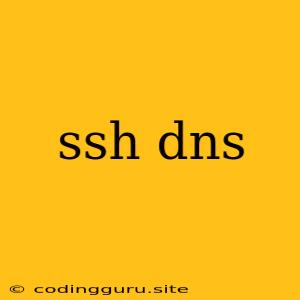SSH and DNS: A Powerful Duo for Secure Network Access
In the world of networking, security and reliability are paramount. We need secure ways to access remote servers and reliable systems to resolve domain names into IP addresses. Two fundamental technologies that play crucial roles in achieving these goals are SSH and DNS.
SSH (Secure Shell) provides a secure channel for remote access to servers. It encrypts all communication between the client and the server, ensuring data privacy and integrity. This is essential when managing sensitive data or executing privileged commands on a remote system.
DNS (Domain Name System) acts as a phonebook for the internet. It translates human-readable domain names like 'google.com' into numerical IP addresses that computers understand. This translation process is crucial for browsing the web, sending emails, and accessing web services.
Why is the Relationship Between SSH and DNS Important?
The connection between SSH and DNS might not be immediately obvious, but it's vital for managing and securing your network. Here's why:
-
Secure Remote Access: SSH allows you to securely access servers using a username and password, or even better, with public and private key authentication. To establish a secure connection, your client needs the server's IP address. This is where DNS comes in, providing the necessary IP address translation.
-
Centralized Management: In larger networks, managing individual server IP addresses can be a tedious task. DNS provides a centralized system for managing domain names and their corresponding IP addresses, making it easier to update server configurations and access them remotely via SSH.
-
Dynamic IP Addressing: Some servers might have dynamic IP addresses, meaning they change periodically. DNS can be used to point a domain name to the current IP address of the server, ensuring you can always reach it via SSH even if the IP address changes.
How to Set Up SSH and DNS for Secure Remote Access
1. Configure DNS:
- Choose a DNS Provider: Select a reliable DNS provider that suits your needs. Many options are available, from free providers like Google Public DNS to paid services offering more features.
- Create a DNS Record: For your server, create an A record (for IPv4) or AAAA record (for IPv6) in your DNS provider's interface. The record should map the domain name you want to use for SSH access to your server's IP address.
- Propagate DNS Changes: It may take some time for DNS changes to propagate across the internet.
2. Configure SSH on your Server:
- Install SSH: Most Linux and Unix systems have SSH pre-installed. On Windows, you can install OpenSSH.
- Configure SSH Port: By default, SSH uses port 22. You can change this port for added security. However, be sure to update the corresponding port number in your DNS A record.
- Set Up SSH Authentication: Choose between password-based authentication (less secure) or public/private key authentication (more secure).
3. Access your Server via SSH:
- Use your domain name: Once your DNS changes have propagated, you can access your server via SSH using the domain name you defined in your A record.
Example:
ssh [email protected]
4. Configure SSH for Public Access (optional):
- Firewall Rules: If you need to expose your server to the internet for SSH access, make sure you have appropriate firewall rules in place to allow inbound traffic on the configured SSH port.
5. Security Best Practices:
- Use strong passwords or SSH keys: Ensure you use strong passwords for your SSH account or generate robust SSH keys for added security.
- Enable SSH Port 22 forwarding: Consider forwarding port 22 to a different port number on your server for added security.
- Limit SSH access to authorized users: Only allow authorized users to access your server via SSH.
- Monitor SSH logs: Regularly check SSH logs for suspicious activity.
Benefits of Using SSH and DNS Together
By integrating SSH and DNS, you gain a robust and secure approach to managing your servers. Here are some key benefits:
- Improved Security: SSH ensures secure communication, while DNS provides a reliable system for resolving domain names, minimizing potential vulnerabilities.
- Simplified Access: Using domain names for SSH access simplifies server management and makes it easier to remember access points.
- Enhanced Flexibility: DNS allows for dynamic IP address management, ensuring you can always access your server via SSH regardless of IP address changes.
- Scalability: DNS scales well with growing networks, providing a centralized point of control for managing server access.
Troubleshooting Common Issues
-
DNS Resolution Errors: If you're unable to connect via SSH using your domain name, verify that the DNS record is correctly configured and has propagated. Use tools like
nslookupordigto check DNS resolution. -
Firewall Issues: Ensure your firewall rules allow inbound traffic on the configured SSH port.
-
SSH Server Configuration: Check that your SSH server is running and configured correctly. Use commands like
ss -a | grep sshto check for SSH connections on your server.
Conclusion
By leveraging the power of SSH and DNS, you can establish a secure and reliable remote access system for your servers. Implementing robust security practices and configuring both technologies correctly ensures data privacy, simplifies server management, and enhances network security. Remember to stay updated on best practices and security guidelines to protect your servers from potential threats.
